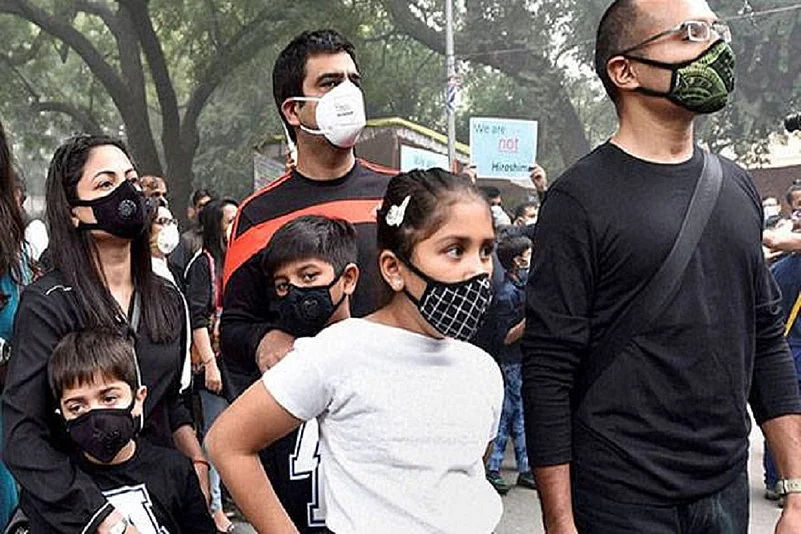If Delhi's foul air is cleaned up and made to meet the World Health Organisation standards, city residents stand to gain nine years in average in their life span, a study has said.
The Air Quality Life Index (AQLI) developed by the Energy Policy Institute at the University of Chicago (EPIC), when applied at the national level, translates to about four additional years over and above the existing average life span of Indians.
The study takes air borne particulate matter pollution, PM 2.5, into account and extrapolates it to see what impact any reduction in its volume would have on the life span of people.
Advertisement
Accordingly, it says that if PM 2.5 quantity in Delhi's air meets the WHO annual standard of 10 micrograms per cubic metre (ug/m3), people can live up to nine years longer and six years longer if it meets the national standard of 40 ug/m3.
The people of Kolkata, Mumbai could live roughly 3.5 years longer if the country met WHO standards and the life span of residents of Lucknow, Patna and Chennai could go up by 7.6, 6.9 and 1,7 years, as per the AQLI chart, which lists 50 regions across India that stand to gain the most.
Products of vehicular and industrial combustion, PM 2.5 are air borne ultra fine particulates, measuring less than 2.5 microns, which can cause irreparable harm to humans by entering the respiratory system and subsequently the bloodstream.
Advertisement
"The AQLI reveals that if India reduced its air pollution to comply with the WHO's air quality standard, its people could live about 4 years longer on average, or a combined more than 4.7 billion life years.
"Some of the greatest gains would be seen in the country's largest cities, such as Delhi. There, people could live 6 years longer if the country met its national standards, and 9 years longer if the country met WHO standards," the study says.
The AQLI arrives at the conclusions by translating the particulate concentrations into their impact on lifespans, "unlike previous studies that tend to rely on data tracking people's exposure over a short time period".
"It suggests that particulates are the greatest current environmental risk to human health, with the impact on life expectancy in many parts of the world similar to the effects of every man, woman and child smoking cigarettes for several decades," Michael Greenstone, Director of EPIC said.
Delhi has consistently ranked high among the list of most polluted cities in the world. The city is gearing up to tackle pollution that reaches perilous levels during the winter months.
According to the union health ministry, the average life expectancy in India is 67.3 years for males and 69.6 years for females.
The findings are based on a research work, published in the peer-reviewed scientific journal 'Proceedings of the National Academy of Sciences', on the harmful effects of a Chinese government policy to provide free coal to a region north of the Huai river.
Advertisement
The researchers found that people residing in the area situated north of the river were living 3.1 years less, in average, than people in the south due to air pollution concentrations that are 46 per cent higher.
These findings imply that every additional 10 ug/m3 of particulate matter pollution (PM10) reduces life expectancy by 0.6 years, the paper says.
Subsequently, the results of the paper were generalized to quantify the number of years that air pollution reduces lifespans around the globe, not just in China, leading to the development of the AQLI tool.
"The AQLI uses the critical data and information gathered from our China research and applies it to every country, allowing the billions of people around the world who are exposed to high air pollution levels to estimate how much longer they would live if they breathed cleaner air," Greenstone said.
Advertisement
The State of Global Air report 2017, released in February, had claimed that surpassing China, India now accounts for the maximum number of premature deaths from ozone pollution and was second in terms of early deaths due to PM 2.5.
The government had disputed the findings. Late Environment Minister Anil Dave had expressed his reservations on the report and had announced that a study would soon be conducted by the Health Ministry on the issue but it has not yet taken off.




















